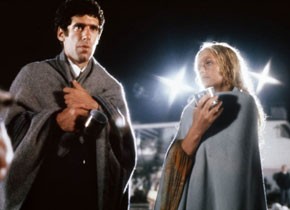Robert Altman
Sixteen Films. 1970-2006
February 10 to March 7, 2012
At the end of Nashville (1975) and the beginning of Buffalo Bill and the Indians (1976), the Stars and Stripes billow in the wind. The flag is an emblem: a symbol of the dream that America dreams of itself, which it perverts and destroys and refuses to stop dreaming – in the form of a sprawling extravaganza of entertainment, politics and business (that is, capitalism plus democracy plus pathos plus advertising) which have become one. Altman, the polemicist: "Since 9/11, when I see an American flag flying, it's a joke." His cinema tirelessly scours the continent of dreams, lies and myths – free of illusion, incorruptible, satirical, comic-tragic. And always with boundless curiosity and paradoxical pleasure: to bathe in a tub of wrath and lust full of contaminated water that will immediately be gleefully poured on the ground of truth. A Long Goodbye à la Altman.
Born in 1925 in Kansas City, Robert Altman flew bombers in World War II, started a dog tattooing business (as rumor has it), wrote stories, plays and scripts, worked in television for a long time and directed his first film in 1955. His meteoric rise to chief anthropologist of the United States began 15 years later with MASH, that cynical farce praised by Pauline Kael as "the best American war comedy since sound came in" and the "sanest American movie of recent years." This coincided with the development of two fertile breeding grounds: the transitional period known as "New Hollywood," after the old studio bosses had retreated and before the new commercial standards of blockbuster cinema arrived; and secondly, under the sign of Vietnam and Watergate, the first era of American insecurity. For a while, Hollywood offered a kind of creative space for new talents, themes and narrative forms, while the disaster of American politics caused the faltering of ideological certainties that had been firmly established over generations.
Alongside Scorsese, Altman was the great realist and innovator of this era, and a profound and adventurous chronicler of the American malaise. Between 1970 and 1977, he worked with classic film genres, which he slaughtered, bent, and deformed: the war movie (MASH), gangster film (Thieves Like Us), film noir (The Long Goodbye), gambling film (California Split), fantasy (Brewster McCloud), political and musical film (Nashville), melodrama (3 Women) – and the Western, the epitome of all American genres: in McCabe & Mrs. Miller and Buffalo Bill and the Indians, capitalism arrives at the American West and showbiz takes over the role of history teacher – by reciting lies in the manner of Buffalo Bill’s Wild West Show (from which, in return, the Hollywood Western would soon be born).
Altman's America is built upon hysteria, neurosis, deceit and glamour. A realm in which individuals have become sick, lonely, crazy, unconscious in thought, impotent, even when they are considered "powerful." This is similarly true for the Hollywood studio executive in The Player or the presidential candidate in Tanner '88 – they are prisoners of the system, invalids of the perverted dream. Such disintegration corresponds to the multi character form which Altman admirably promoted in film after film, that of a fragmented, vibrant, anxious and panoramic narrative: the fixed plot is replaced by improvisation, the protagonist by a chorus, the dialogue by a buzz of voices and sounds, the static image by a network of zooms and flowing camera moves.
“Enter chaos”: Ever since Nashville, the only appropriate term for polyphonic, multi-layered realism might be “Altmanesque.” In very specific ways, Altman demonstrated how dizzyingly diverse, conspicuously contradictory, in short: how chaotic our so-called reality can be. Although he was known as a grand master of social dissection, Altman’s strength is not so much in the field of analysis but in his revelatory amplification of the “atmospheric” – a rapturous yet sinister and precise type of observation. The fact that he observes what he has previously staged is part of his paradoxical genius. Altman rolls up his sleeves and makes everyday chaos look easy, fun and overwhelmingly documentary-like.
Related materials
